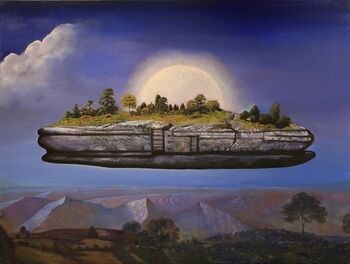Difference between revisions of "Utopia"
(start) |
(re wording) |
||
| (3 intermediate revisions by the same user not shown) | |||
| Line 13: | Line 13: | ||
|image_credit = | |image_credit = | ||
|image_ref = | |image_ref = | ||
| − | |image_width = | + | |image_width = 350 |
|type = | |type = | ||
|start = | |start = | ||
| Line 20: | Line 20: | ||
|wikipedia = https://en.wikipedia.org/wiki/Utopia | |wikipedia = https://en.wikipedia.org/wiki/Utopia | ||
}} | }} | ||
| − | A '''utopia''' is an imagined community or [[society]] that possesses highly desirable or nearly perfect qualities for its citizens. The term was coined by [[Sir Thomas More]] for his 1516 book ''Utopia'', describing a fictional island society in the south Atlantic Ocean off the coast of [[South America]].<ref>https://steemit.com/politics/@stevescoins/utopia-always-leads-to-dystopia</ref> The opposite of a utopia is a [[dystopia]], which dominates [[sci-fi]] literature. | + | A '''utopia''' is an imagined community or [[society]] that possesses highly desirable or nearly perfect qualities for its citizens. The term was coined by [[Sir Thomas More]] for his 1516 book ''Utopia'', describing a fictional island society in the south Atlantic Ocean off the coast of [[South America]].<ref>https://steemit.com/politics/@stevescoins/utopia-always-leads-to-dystopia saved at [https://web.archive.org/web/20170603063424/https://steemit.com/politics/@stevescoins/utopia-always-leads-to-dystopia Archive.org] saved at [https://archive.vn/7LyaC Archive.is]</ref> The opposite of a utopia is a [[dystopia]], which dominates [[sci-fi]] literature. |
A utopia focuses on equality in such categories as [[economics]], quality of living, [[health]], [[education]], [[government]], [[justice]], with the method and structure of proposed implementation varying based on ideology. Some argue that utopia's nature is inherently contradictory because societies are not homogeneous and have desires which conflict and therefore cannot simultaneously be satisfied. | A utopia focuses on equality in such categories as [[economics]], quality of living, [[health]], [[education]], [[government]], [[justice]], with the method and structure of proposed implementation varying based on ideology. Some argue that utopia's nature is inherently contradictory because societies are not homogeneous and have desires which conflict and therefore cannot simultaneously be satisfied. | ||
| − | There are socialist, capitalist, monarchical, democratic, anarchist, ecological, | + | There are [[socialist]], [[capitalist]], [[monarchical]], [[democratic]], [[anarchist]], ecological, [[matriarchal]], [[patriarchal]], [[egalitarian]], hierarchical, [[racist]], [[left-wing]], [[right-wing]], religious, free love, [[nuclear family]], extended family, [[gay]], [[lesbian]], [[technocratic]], high-intelligence and many more utopias. |
A solution to circumvent this is to make humans more equal and push all individuality out of society. | A solution to circumvent this is to make humans more equal and push all individuality out of society. | ||
| Line 32: | Line 32: | ||
==References== | ==References== | ||
{{reflist}} | {{reflist}} | ||
| − | |||
Latest revision as of 20:25, 2 April 2021
 | |
| Founder(s) | Sir Thomas More |
| Interest of | Scientism/Invisible College |
A utopia is an imagined community or society that possesses highly desirable or nearly perfect qualities for its citizens. The term was coined by Sir Thomas More for his 1516 book Utopia, describing a fictional island society in the south Atlantic Ocean off the coast of South America.[1] The opposite of a utopia is a dystopia, which dominates sci-fi literature.
A utopia focuses on equality in such categories as economics, quality of living, health, education, government, justice, with the method and structure of proposed implementation varying based on ideology. Some argue that utopia's nature is inherently contradictory because societies are not homogeneous and have desires which conflict and therefore cannot simultaneously be satisfied.
There are socialist, capitalist, monarchical, democratic, anarchist, ecological, matriarchal, patriarchal, egalitarian, hierarchical, racist, left-wing, right-wing, religious, free love, nuclear family, extended family, gay, lesbian, technocratic, high-intelligence and many more utopias.
A solution to circumvent this is to make humans more equal and push all individuality out of society.